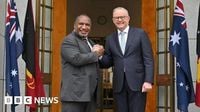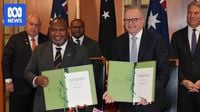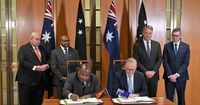On October 6, 2025, the governments of Australia and Papua New Guinea (PNG) signed a landmark agreement that is already being hailed as a turning point for security and alliances in the Pacific. The so-called "Pukpuk Treaty"—named after the Tok Pisin word for crocodile—was inked at Australia's Parliament House in Canberra by Prime Ministers Anthony Albanese and James Marape. The deal marks Australia's first new alliance-level defense pact in over seventy years, and for Papua New Guinea, its first such treaty since gaining independence.
The treaty creates a mutual defense obligation between the two countries, echoing the commitments found in the longstanding ANZUS Treaty that Australia shares with the United States and New Zealand. As Prime Minister Albanese described it at the signing ceremony, "This treaty contains a mutual defense obligation similar to Australia’s ANZUS Treaty commitments, where we declare that in the event of an armed attack on either of our countries, we would both act to meet the common danger." Albanese called it "an historic day for both nations" and noted, "We consider it a great honor that our nearest neighbor is our newest ally."
The agreement goes beyond mere symbolism. It allows Australian troops access to PNG military bases and, in a move that analysts say could reshape the region’s military landscape, enables up to 10,000 Papua New Guineans to serve in Australia’s armed forces. According to ABC News, PNG permanent residents living in Australia will be eligible to join the Australian Defence Force (ADF) starting January 1, 2026. There is also a potential—though not yet formalized—pathway for Australians to serve in PNG’s defense forces in the future.
For Papua New Guinea, a nation with a relatively small and under-resourced military, the treaty promises significant modernization and training support. "Through continuous cooperation, the countries will assist one another to maintain and develop their individual and collective capacity to protect their sovereignty, and deter and resist external threats and armed attacks," states the official document. PNG’s army is expected to benefit from joint annual military exercises, intelligence sharing, and expanded training—elements that PNG Defense Minister Billy Joseph said would provide "a significant boost in both material and morale terms."
But it is the broader geopolitical context that has drawn the world’s attention to the Pukpuk Treaty. In recent years, China has steadily increased its presence in the Pacific, signing security and policing agreements with countries like Solomon Islands and Kiribati, and investing heavily in regional infrastructure. According to the BBC, Australia has responded by accelerating its own outreach, committing more than A$500 million to policing, cyber infrastructure, and climate resilience projects across the Pacific in the past two years.
Many observers see the new treaty as a direct response to this shifting balance of power. As Anna Powles, a security studies expert at Massey University in New Zealand, told the BBC, "The Pukpuk Treaty gives Australia a central role in a new ‘hub-and-spokes’ defense system across the Pacific." Oliver Nobetau, project director of the Lowy Institute’s Australia–PNG Network, was even more blunt: "China will not have the same access to infrastructure in PNG as it does in other Pacific Islands. This deal ensures that Port Moresby’s key facilities remain under the purview of its trusted regional partner—Australia."
China, for its part, has voiced strong concerns about the pact. After the treaty’s core principles were announced last month, the Chinese Embassy in Papua New Guinea issued a statement urging that such agreements "should not be exclusive in nature, nor should it restrict or prevent a sovereign country from cooperating with a third party for any reason." The embassy further warned that the pact "should also refrain from targeting any third party or undermining its legitimate rights and interests."
Prime Minister Marape has been at pains to reassure Beijing that PNG’s foreign policy remains unchanged. "This is not a treaty that sets up enemies but consolidates friendships and China—we’ve been transparent—we have told them that Australia … has become our security partner of choice and they understand," Marape explained at the signing. He added, "Our broader relations with China—in trade and investment—remain intact and transparent."
Still, the treaty is not without controversy within Papua New Guinea itself. While many in the government back the agreement, some opposition figures and former military leaders have raised alarms about potential threats to national sovereignty. Jerry Singirok, a former commander of PNG’s Defense Force, warned last month that the treaty "could come at a high cost" if it aligns PNG too closely with Western defense strategies. "China is not our enemy," Singirok said, urging that PNG's sovereignty and neutrality be respected.
PNG’s opposition leader was even more critical, charging that Australia’s primary interest is "protecting themselves," and that the agreement does little to address PNG’s own internal security challenges. "They want to see Papua New Guineans being belittled, they want to see Papua New Guineans being pushed to the corner. They want to see Papua New Guineans become nobody. That's what Australia wants," he said. Marape, however, responded by promising "full disclosure" to PNG’s parliament and allowing the ratification process to take its course.
For Canberra, the Pukpuk Treaty represents a strategic victory and a clear signal to both allies and competitors. As Nobetau noted, "This treaty demonstrates that Australia and PNG can stand together as equal partners in maintaining regional stability." The deal also gives Australia greater leverage in the Pacific, making it more difficult for China to expand its defense cooperation with Port Moresby.
What lies ahead? The treaty must still be ratified by both the Australian and Papua New Guinean parliaments before coming into effect. While passage in Australia is expected to be smooth, PNG’s parliamentary debate may be more contentious, given the concerns about sovereignty and neutrality. If ratified, the first joint Australia–PNG military exercises under the new framework are expected to take place in early 2026.
As Prime Minister Marape summed up at the ceremony, "The spirit of the crocodile is to protect and defend its home—that is what this treaty is about. Two nations, bound by friendship and shared responsibility, ensuring peace for the Pacific."
The Pukpuk Treaty may yet face hurdles, but it has already shifted the security dynamics of the Pacific, setting the stage for a new era of regional cooperation—and competition.



